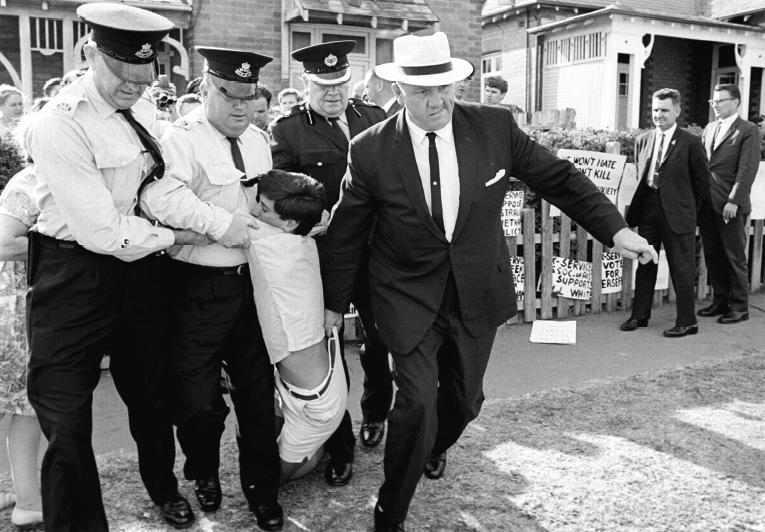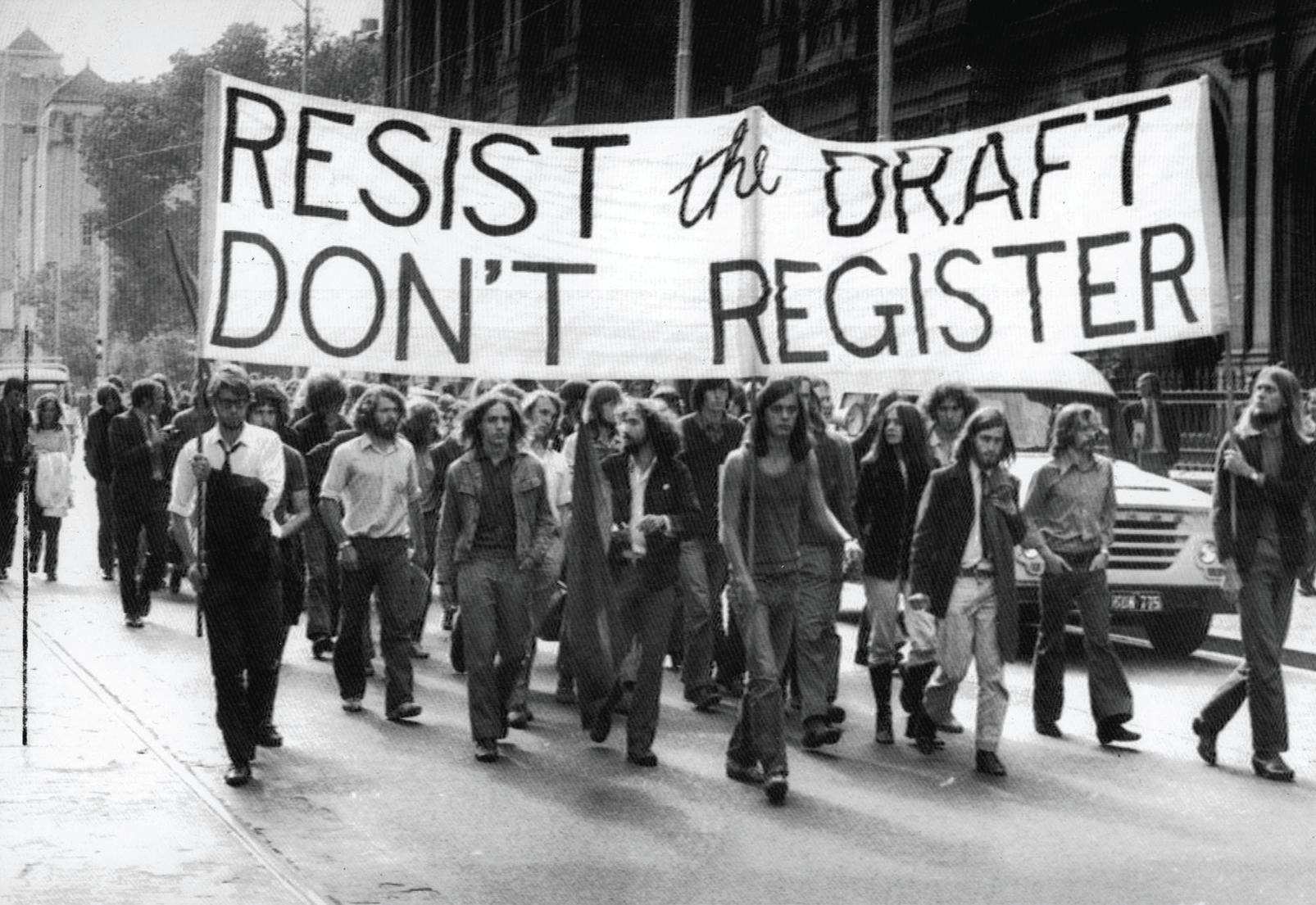
~
Vietnam War
Definition
"A conscientious objector is a person whose beliefs, ideals and ethics are incompatible with military service, a role in the armed forces or participation in war."
A prime example of a conscientious objector during the Vietnam War was William White, a Sydney school teacher who defied a notice to report to an army induction centre, upon the basis that he felt he was being asked to "kill another fellow being". White became the first Australian to publicly stand as a conscientious objector of war and his decisions led to a standoff when authorities dragged White from his home after days of media coverage that brought embarrassment to the Australian Government.

Conscientious objector William White being dragged from his home in Sydney after being arrested, 1966
(Experience Of Nationhood)
During the Vietnam War
During the Vietnam War, men could refuse to apply for National Service if they successfully claimed "conscientious objector" status. This status would then had to be proved in a court of law where the individual had to present "deep-seated and compelling" reasons why he/she could not take an active role in the military forces. However, statistics show that the number of men would claimed to be conscientious objectors was smaller than previously thought. Over 800,000 young men applied for National Service between 1964 and 1972 and only 1242 were considered the status of "conscientious objector".
The Anti-War Movement
No previous war caused more social divisions within Australian than the events of the Vietnam War, with the reintroduction of conscription prompting much moral and social conflict. Australia's illfeeling towards the war was growing rapidly however Prime Minister John Gorton stood firm in Australia's commitment to the war effort.

Anti-movement demonstrations in the US capital, Washington DC
(Google Images)
On the other side of the world, strong anti-war movements took place in the United States as the people were wearied by the heavy burdens of the war and the high costs of living that it brought. A year after Holt's death in 1968, President Johnson, exhausted by the war, resigned his term in office and Richard Nixon replaced him later that year. Similarly in Australia, the growing resentment towards the war was led by the opposition Labor Party who saw this as an opportunity to gain political advantage. Another group was established by mothers called "Save Our Sons" (SOS), who campaigned against the conscription of young men. Universities became centres of public opposition, with numerous protests and rallies occurring along with public figures speaking out against the war. One highly controversial event occurred at Monash University when students raised money to support the National Liberation Front (Vietcong), leading to major conflict in and around the campus.

Protestor burning his registration form
(Experience of Nationhood)
As more and and more young men refused to apply for national service, many burnt their registration forms as an act of defiance towards the Gorton government. This in turn altered the National Service Act in May 1968, imposing a 2-year prison term for those who avoided conscription and active military service. A Draft Resistors Union was created in light of the government's conscription policy, to assist young men in avoiding National Service. In October 1969, John Zarb became the first Australian citizen to be imprisoned for a 2-year term for failing to register into National Service and subsequently many protests demanded he be freed in the "Free Zarb" campaign. 10 months later, Zarb was released from prison.

Demonstration in Sydney protesting against the conscription of young men (Draft Resistors Union)
In 1970, there were major anti-war activities that took place in two capital cities. The "Vietnam moratorium marches" were well-organised and peaceful demonstrations that attracted mass support from ordinary citizens. The first protest was in Melbourne in May 1970 when crowds of over 100,000 gathered in a major protest against the war. Dr Jim Cairns, a Labor politician and leader of the Vietnam moratorium marches commented on numbers of the day; "What is being done in Vietnam moratorium campaign is an example of government by the people, it is an example of people taking action about issues that are important to them...there is intense and widespread opposition to the death and destruction."
Group Members
Luke Davis
Andrew Lee
Ben Davis (editor)
Claire Ferguson (editor)
Multimedia Display

Bob Dylan - Blowin' In the Wind'
Reference
ABC 2007, Draft Resisters, 6th June 2007, http://www.abc.net.au/gnt/history/Transcripts/s1162103.htm
Manson, 2005, Experience of Nationahood, McGraw-Hill Australia Pty Ltd, Sydney
The Age 2007, Jim Cairns anti war hero, Labour icon, dead at 89, 5th June 2007, http://www.theage.com.au/articles/2003/10/12/106591776600.html
Wikipedia 2007, Conscientious Objector, 6th June 2007, http://en.wikipedia.org/wiki/Conscientious_objector
Wikipedia 2007, William White, 6th June 2007, http://en.wikipedia.org/wiki/William_White
Comments (8)
Anonymous said
at 8:51 am on Jun 13, 2007
A masterpiece in internet form. the two people who made this should be very proud. andrew is awesome. very catchy. lots of info.gets to the point. very nice.some links. you guys are awesome. if i was able to give you a mark it would be 99.9%. you lost marks becasue it has no background
Anonymous said
at 8:52 am on Jun 13, 2007
Marking: Your project is insane. It is very informative, great refrencing, great headings, great pictures. However in some areas is hard to understand. the strucure and layout is well prresented and overall a very pleasing project.
Anonymous said
at 9:04 am on Jun 13, 2007
ok so u hav headings, referencing, information and pictures, its really freak so well done i guess, its pleasing to the eyes and the info seems well written
yay for you
Anonymous said
at 9:05 am on Jun 13, 2007
Good work Luke, try harder andrew lee.
Anonymous said
at 1:10 pm on Jun 13, 2007
clearly the work of conscientious students. No objections? ('scuse the pun)
Anonymous said
at 8:57 am on Jun 14, 2007
Andrew Lee how about not doing all of the work?
I can tell Luke didn't do much of this...
Anonymous said
at 9:25 am on Jun 14, 2007
HI.
we edited your wiki.
we changed bits.. now you can understand it.
woop.
love claire and ben
=D=D
Anonymous said
at 10:04 am on Jun 19, 2007
Hi guys your bob dylan-blowing in the wind clip doesn't actually work so unless it does work u will have to delete it soz claire and ben
You don't have permission to comment on this page.